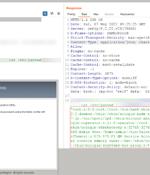Security News

A recently disclosed F5 BIG-IP vulnerability has been used in destructive attacks, attempting to erase a device's file system and make the server unusable. Last week, F5 disclosed a vulnerability tracked as CVE-2022-1388 that allows remote attackers to execute commands on BIG-IP network devices as 'root' without authentication.

Threat actors have started exploiting a critical bug in the application service provider F5's BIG-IP modules after a working exploit of the vulnerability was publicly made available. A shodan query shared by security researcher Jacob Baines revealed thousands of exposed BIG-IP systems on the internet, which an attacker can leverage to exploit remotely.

Days after F5 released patches for a critical remote code execution vulnerability affecting its BIG-IP family of products, security researchers are warning that they were able to create an exploit for the shortcoming. The critical security vulnerability impacts the following versions of BIG-IP products -.

Threat actors have started massively exploiting the critical vulnerability tracked as CVE-2022-1388, which affects multiple versions of all F5 BIG-IP modules, to drop malicious payloads. F5 last week released patches for the security issue, which affects the BIG-IP iControl REST authentication component.

Threat actors have started massively exploiting the critical vulnerability tracked as CVE-2022-1388, which affects multiple versions of all F5 BIG-IP modules, to drop malicious payloads. F5 last week released patches for the security issue, which affects the BIG-IP iControl REST authentication component.

Researchers have developed PoC exploits for CVE-2022-1388, a critical remote code execution bug affecting F5 BIG-IP multi-purpose networking devices/modules. We have reproduced the fresh CVE-2022-1388 in F5's BIG-IP. Successful exploitation could lead to RCE from an unauthenticated user.

Security researchers are warning F5 BIG-IP admins to immediately install the latest security updates after creating exploits for a recently disclosed critical CVE-2022-1388 remote code execution vulnerability. Last week, F5 disclosed a new critical remote code execution in BIG-IP networking devices tracked as CVE-2022-1388.

TLStorm 2.0: Critical bugs in widely-used Aruba, Avaya network switchesArmis researchers have discovered five critical vulnerabilities in the implementation of TLS communications in multiple models of network switches. Critical F5 BIG-IP flaw allows device takeover, patch ASAP!F5 Networks' BIG-IP multi-purpose networking devices/modules are vulnerable to unauthenticated remote code execution attacks via CVE-2022-1388.

F5 Networks and Cisco this week issued warnings about serious, and in some cases critical, security vulnerabilities in their products. "This vulnerability may allow an unauthenticated attacker with network access to the BIG-IP system through the management port and/or self IP addresses to execute arbitrary system commands, create or delete files, or disable services," as F5 put it in its advisory.

Application service provider F5 is warning a critical vulnerability allows unauthenticated hackers with network access to execute arbitrary commands on its BIG-IP systems. Threat actors can send undisclosed requests and leverage the flaw to bypass the iControl REST authentication and access the F5 BIG-IP systems, an attacker can execute arbitrary commands, create or delete files or disable servers.